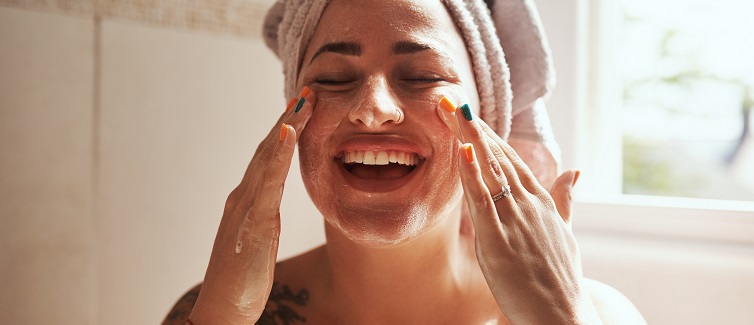For many, nothing is more relaxing than a long, hot shower or soothing soak in the tub. It can relieve stress, induce sleep, and help clear nasal congestion.
During the winter months, many people enjoy taking a soak or shower in hot water to warm up and shake off the chill. Although tub time may feel like a luxury, it can wreak havoc on your skin by drying it out if done too often or if the water is too hot.
What Does Skin Do?
The skin is the largest organ of the body and is made up of three layers called the epidermis, the dermis, and the hypodermis that:
- Protect us from germs.
- Control body temperature.
- Work with the nervous system to regulate sensations such as touch, heat and cold.
Never Miss a Beat!
Subscribe to Our HealthBeat Newsletter!
Thank you for subscribing!
You can now select the specific newsletters you'd like to receive.
You are already subscribed.
Subscribe to more newsletters in our email preference center.
Sorry, an error occurred. Please try again later.
Get Healthy Tips Sent to Your Phone!
Will a Hot Shower Dry Your Skin?
Hot showers and baths can inflame the skin, causing redness, itching, and even peeling — similar to a sunburn. They also can disrupt the skin’s natural balance of moisture, robbing you of the natural oils, fats, and proteins that keep skin healthy. Dry skin can increase your chances of infection and actually lead to an overproduction of oils in an effort to compensate for the lack of moisture.
How to Stop Itching After A Shower
Help keep your skin healthy by following these few simple steps from Nick Woltjen, MPAS, PA-C, UPMC Department of Dermatology, when bathing:
Turn Down the Water Temperature.
Frequent hot showers and baths can lead to dry, itchy skin or even rashes. Cooler or lukewarm showers even just a few times a week can keep skin hydrated and help hair stay strong and shiny. If your skin appears red following your bath or shower, your water is too hot.
Benefits of taking a cold shower
- Increased circulation.
- Calming itchy skin.
- Temporary increase to metabolism.
Decrease Your Bathing Time
Spending less time in the tub not only benefits your skin, but you’ll decrease the amount of water wasted, too. Step out of the tub before your skin appears wrinkled like a prune. Depending on factors such as your daily activity level, profession, or season, you might even be able to skip a full daily shower here and there.
How long should you shower?
Skin, just like the rest of the body, needs water to function properly. Experts believe a shower should only last about 5 to 10 minutes. Any longer and the hot water may strip away the natural oils of the skin and leave the pores open for moisture to escape.
Avoid Harsh Soaps
Soap is drying to the skin, stripping away the natural oil barrier, and many are filled with chemicals that are applied directly to your body before washing away into our water supply. Instead, try a mild, fragrance-free, non-soap cleanser (you won’t see lots of lather as with soaps) or moisturizing shower gel or oil.
Moisturize Your Skin
Pat yourself dry and apply an unscented lotion, cream, or oil to your still-damp skin. This will help lock in moisture. For most people, a light, water-based moisturizer is adequate. Noncomedogenic products won’t clog your pores; while ingredients such as aloe, oatmeal, and chamomile offer soothing qualities. Also, consider a product that contains ceramides. Ceramides help protect and retain the needed moisture for your skin.
When to See a Dermatologist
Experiment with different bathing routines until you find one that makes your skin look and feel healthy. Skin can be easily affected by changes in products, weather, and hormones. If you have dry itchy skin or a rash in that won’t heal, you should contact a dermatologist.
Contact a dermatologist if you’re having trouble finding a skincare regimen that works for you. They can assess your skin and recommend a skin care plan specifically for you. Schedule an appointment with the dermatology experts at UPMC or visit the website online for more information on services and skin conditions.
Editor's Note: This article was originally published on , and was last reviewed on .
About Dermatology
The UPMC Department of Dermatology diagnoses, treats, and manages numerous hair, skin, and nail conditions and diseases. We care for common and uncommon conditions, and our treatments include both surgical and nonsurgical options. We operate several specialty centers for various conditions. The UPMC Cosmetic Surgery and Skin Health Center is a comprehensive dermatologic laser facility, offering a full range of cosmetic services and procedures. With UPMC Hillman Cancer Center, we offer a Skin Cancer Program that provides complete care from screenings, diagnosis, treatment, and beyond. Find a dermatology provider near you.
